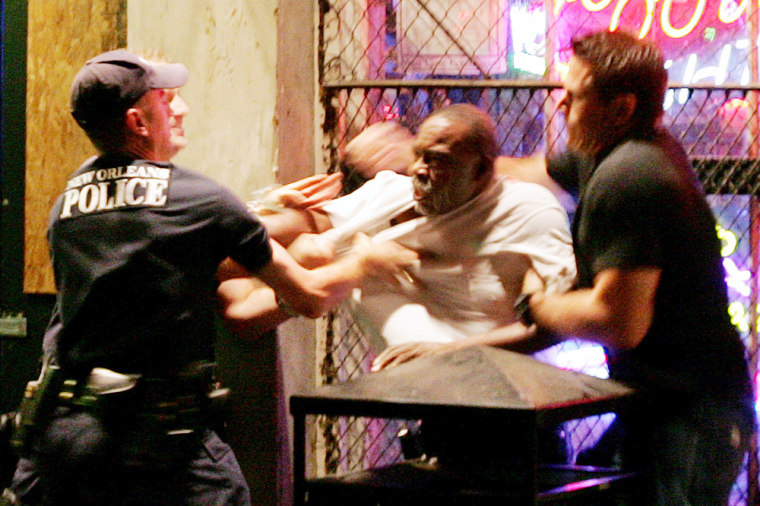Desertions, allegations of looting and theft, and the videotaped beating of a retired teacher have contributed to a growing sense that the New Orleans Police Department is reverting to its dirty-cop past at the very moment the city is desperately trying to persuade residents to come back to the Big Easy.
No hard evidence exists of a rise in police misconduct since Hurricane Katrina hit on Aug. 29.
But the American Civil Liberties Union of Louisiana said it is investigating at least 10 brutality complaints filed in the past month or so. And stories are making the rounds at Uptown coffee houses and French Quarter bars of overbearing cops abusing their power, of a force seemingly out of control.
“There’s a credibility issue that is manifesting itself in New Orleans,” said Rafael Goyeneche of the Metropolitan Crime Commission of Greater New Orleans, a police watchdog group. “Part of that is the disconnect the public feels with the police department. The reputation of corruption lingers and the new problems compound it.”
Damning videotape
Since the storm, the videotaped beating by police of Robert Davis, 64, and the roughing up an Associated Press TV producer in the French Quarter have focused new attention on the department. Police said Davis was drunk and combative; Davis denied he was drinking and said he put up no resistance. The Justice Department is investigating.
Also, 12 New Orleans officers are suspected of looting or condoning looting at a Wal-Mart in Katrina’s aftermath. Authorities are investigating allegations that police took more than 200 cars, including 41 new Cadillacs, from a dealership as the storm closed in. And nearly 250 officers on the 1,450-member force are under investigation for leaving their posts during the storm.
“People are right on the edge because they think police are hired to protect them, but that’s not what seems to be happening,” said John Penny, who teaches criminal justice at Southern University at New Orleans. “I think there’s a high feeling of anxiety in the community.”
‘They pulled their guns out’
Josh Clark, who works for a monthly entertainment publication, admitted he and his girlfriend were out past curfew two weeks after Katrina. Still, he said, the police reaction seemed extreme.
“They pulled their guns out and pointed them at us,” Clark said. “They wouldn’t listen to anything.”
Clark said he was finally able to show his press pass to one of the officers. He said that when the policeman learned he worked for a publication whose editor was a friend, Clark and his girlfriend were allowed to leave.
“If they know you, they’ll do anything for you,” Clark said. “If they don’t, you’re in deep doo-doo.”
Police spokesman Marlon Defillo denied the department is slipping back into its old habits, saying discipline is being maintained. He said the department has launched four formal investigations post-Katrina into police wrongdoing.
Asked about the notion that the department is out of control, Mayor Ray Nagin said Wednesday: “We’re going to have to deal with this perception as we’re going forward.”
He acknowledged the department “is a little battered and torn right now” and said all officers had gone through physical and psychological evaluations since the storm. He also noted that two officers had committed suicide.
“They have gone through hell and back,” he said.
But Nagin added: “We’re going to try to deal with this as best we can. We are going to infuse the police department with new blood. We’re going to build one of the best departments in the country. That’s all we can do.”
A long history
The department’s reputation for corruption and brutality goes back generations, but it was solidified in the 1990s when police were arrested for crimes ranging from shoplifting and bribery to bank robbery, drug dealing, rape and murder. Two officers from that period are on death row, one for having a woman killed after she filed a complaint against him.
Former Police Superintendent Richard Pennington, now Atlanta’s chief, is widely credited with cleaning up the department, purging it of scores of bad cops and establishing procedures for investigating complaints. Critics say many of those reforms have fallen into disuse.
“We’re back in denial,” said civil rights attorney Mary Howell. “If people are saying there isn’t a problem, that’s part of the problem.”
Since Katrina, there has been widespread suspicion among police watchdog groups that the misconduct reflects the unprecedented stresses and demands put on officers by the hurricane, which wiped out many cops’ homes and scattered their families.
Concerns even before Katrina
But even before the hurricane, the City Council was concerned enough about misconduct that it planned to hold a hearing on the subject. Katrina forced its cancellation.
It is impossible to say how big the problem is because there has been so much chaos since the storm hit. Floodwaters wiped out some police records, and independent agencies that take complaints have only recently re-established telephone service.
Warren Riley, who took over as superintendent last month, does seem determined to restore public confidence in the department, said Goyeneche, who met with Riley this week.
That will be difficult, said Ed White, spokesman for Louisiana Victims and Citizens Against Crime. “We’re asking people to return to this city and rebuild it and their lives,” White said. “If people don’t have confidence in the police doing their jobs, why would they do that?”
Penny said decisive action is needed to prove to returning residents they will be protected by police, not terrorized by them. “We have to have that administrative, managerial cleansing so people will gain confidence to be in a city that’s being protected,” he said.
